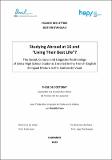Studying Abroad at 16 and “Living their Best Lives”? The social, cultural and linguistic positionings of Swiss high school students enrolled in the French-English Bilingual Matura in the Canton de Vaud

Auteur, co-auteurs
Type de référence
Date
2023-09-15Langue de la référence
AnglaisEntité(s) de recherche
Résumé
My study is centered on the study abroad (SA) experiences of high school students enrolled in the French-English bilingual Matura programme in the canton de Vaud, in Switzerland. It aims at exploring students’ experiences abroad regarding their social, cultural, and linguistic positionings, and their possible impact on the SA experience. Nine high school students agreed to participate in the study, which was designed for them as a support programme, consisting of two introduction meetings before their departure, an online diary while abroad and a final interview after their return. Thus, the primary data are students’ narratives and a narrative approach to the data is taken, both in the analysis and in the presentation of the results. Each student’s experiences are first re-written in the form of three narratives focused on their social, cultural and linguistic positionings. Then, for each participant, one diary or interview extract which tends to represent a recurrent positioning is analyzed using positioning analysis. This comprehensive method offers a systematic way to move from the micro, the text itself, to the meso and the relationship with the researcher, to finally reach the macro and dominant discourses. A comparison of the different experiences concludes the analysis and shows a great variety of experiences among participants, explained through different social, cultural, and linguistic positionings. Socially, the importance of their peers, the other Swiss students, was central to all participants although the way they envisaged their experience from within that group changed. Some felt that this group was enough and did not seek other relationships, others tried to reach the locals as a group, with varying results, and finally a few took this group as a safe base to take more risks on their own to meet the locals. The latter were indeed difficult to reach, as they were indifferent at best, and sometimes even mistreating. Host families also played an important part in adolescents’ experiences, given their relatively young age. Their home family also tended to be rather present for the same reason. Culturally, students’ perspectives tended to be rather ethnocentric, as their Swiss beliefs and values remained central to their understanding of differences. But many made a conscious effort to respect and try to understand the locals’ habits and values. Linguistically, all participants developed a sense of self-efficacy and self-confidence having moved from being an L2 learner to an L2 user, but some contexts, such as the classroom, were perceived as too dangerous for them to really participate. At the same time, a few managed to position themselves positively – as multilingual and multicompetent – a more valuable condition than monolingualism. To conclude, a tool is proposed to read the richness of each experience combining the three different positionings to personal and external factors. This table can be useful to research adolescents abroad but also to support future bilingual Matura students. This study offers precious insights into adolescents’ experiences abroad, a subject which is understudied, and proposes practical suggestions to develop a support programme to accompany high school students abroad.Ville d’édition
LausannePays d'édition
SuisseDirecteur(s) de thèse
Auer, AnitaThonhauser, Ingo
Intitulé du diplôme lié à la thèse
Doctorat es LettresInstitution(s) liée(s) à la thèse
Université de LausanneHEP Vaud
URL permanente ORFEE
http://hdl.handle.net/20.500.12162/8425Document(s) associé(s) à la référence
- Tout ORFEE
- Détail référence



